February 23, 2025
Acts 3:1 – 10
Today is the fourth Sunday of this sermon series I’m calling “Finding Our Balance.” I had the idea for this series because as I’m sure you’ve noticed, we’re living in what we might call weird times. The political and social landscape is changing so fast and so jarringly it’s hard to keep up. People are sharply divided about what our problems even are, let alone what should be done about them. I hear all the time about people losing friends and family relationships because of political or social disagreements; it’s probably happened to some of us. So I often feel like I’m off balance, back on my heels. I can’t keep my feet. Life is changing too quickly. I don’t know how to respond.
Of course, one way to deal with it all is to check out. Don’t look at online news. Don’t read newspapers or watch the news on TV. Don’t follow social media. Just bury our heads in the sand and and tune out. It’s tempting, or at least it is for me. And frankly I’ve been surprised at the number of people across the political spectrum who’ve told me they’re doing just that.
Like I’ve said before, I think in some ways that’s a healthy impulse. It’s probably a good idea to at least limit our intake of political news or social media or wherever we get our information about current events. We’ve got to protect our sanity and our emotional health. And this is true nomatter where you are politically. It doesn’t matter whether your side won or lost the most recent election or court battle or legislative fight: our political scene right now is crazy, and it tends to take over everything else. It’s like everything we do, every decision we make, has some political weight and interpersonal implications that have to be considered. So I know it can be helpful to just turn it off for a while, even as we realize that’s a privilege that not everybody has. Some people are not in a position to be able to tune out the news.
At the same time, I do think part of the church’s work right now is to tend society’s wounds, to help mend the social fabric, to create a more compassionate and nurturing environment for everybody.
I’m part of this prayer group, or maybe I’d call it a spiritual accountability group. We meet once a month, as we’ve been doing for probably the last six or eight years, something like that. We usually keep silence together for 15 or 20 minutes, and then we talk about some variation of the classic Wesleyan small group question: “how goes it with your soul?”
Yesterday at our monthly meeting, somebody said, “I feel like our time together is more important now than ever.” I agree, and I don’t think it’s true just for that group. I think we all need our faith life and prayer and spiritual practice right now. And while I really hope this doesn’t sound arrogant or grandiose, I also think that the world needs us to engage in spiritual life. Because in a time like this, when all of us can be so easily tempted to divide into our little teams and our little echo chambers and fall into fear and anger and contempt for one another – at a time like this, our spiritual life and faith tradition can help us find our balance so we’re not spending every day whipsawed around from one state of outraged reactivity to the next. Instead, we can respond mindfully, faithfully, as the people of God.
So three weeks ago, we looked at Nicodemus, in the Gospel of John. Nicodemus is a well-regarded 1st century Pharisee who finds himself drawn to the way of life Jesus teaches. When Nicodemus hears the High Priest and other leaders in Jerusalem plotting to have Jesus arrested and killed, he steps forward to remind them that their own law says they can’t condemn anyone without a fair hearing. He invites them to live by the principles they profess; he reminds them of some of the best in their own tradition. I think we’re called to do the same. At a time like this, when we might feel attacked and give way to our own desire for vengeance and power and victory, it’s important for us to stay grounded in the best of our tradition – calling us to lives of faith, and hope, and love; lives of compassion and reverence for the image of God in every human being and in all of God’s created order.
Two weeks back, I focused on how in his trial, when Jesus is dragged before the religious leadership of Jerusalem and before the Roman Governor Pilate, he chooses to keep silence. He chooses not to respond to the hatred and accusations directed against him. People have different ideas about why he makes this choice. But whatever his reason, in that moment he chooses silence.
I think maybe there’s a lesson in that for us. We don’t have to have a powerful, biting, decisive answer to every political provocation. We don’t have to be baited into reactivity every time someone says something we disagree with. We can choose to keep silence. We can choose when and how to respond. We can choose to simply listen deeply, without preparing the perfect acid – tongued retort to silence our opponent. If we choose that kind of listening, we’re beginning to offer others the full and gracious attention God is always giving us. That in itself can be transformative.
This is not to say that we don’t ever have to respond. Sometimes we do. It’s just to say that we don’t have to react to every provocation. We can respond mindfully and strongly in a way that seems best and most compassionate and most effective to us.
Last week, I talked about the Biblical Book of Ruth. In some ways Ruth is kind of complex, even though it’s very short. But in another way, it’s not complex at all. I think one of the takeaway lessons from that Book is that God’s work in the world can be moved forward by our ability to create friendships and loyalty and commitment to one another across the cultural and political divides we create.
This morning, we heard a story from the Book of Acts. Acts is the story of the first Christians carrying on the Christian movement after Jesus’ death and resurrection. They’re trying to figure how to live this new way of life; how to create this new community that today we call a church. So in the passage we heard, Peter and John, two of Jesus’ first disciples, are headed into the temple to pray. And at the entrance, they see a man who has never been able to walk or even stand. People carry him to the gate of the temple every day so he can beg for money. Now, it’s helpful to understand here that his friends drop him off at the gate of the temple because at that time he was not allowed to be inside. (Now, we all realize that this sort of thing is not a Jewish belief anymore, right? It just isn’t, any more than it’s a Christian belief. But at the time it was.) The Book of Leviticus has a list of what it calls “blemishes” that make people unfit to worship in the temple, and one of them is the inability to walk. So this man is not just someone who can’t move under his own power. He’s literally an outsider: he can’t come in. He’s viewed as being unclean and offensive to God.
So Peter says to him, “I have no silver or gold, but what I have I give you: in the name of Jesus Christ of Nazareth, stand up and walk.” And suddenly, the man who’s never stood in his life can leap and walk with Peter and John into the temple to pray and praise God.
I think we’re supposed to notice two things about this miracle from the way the author tells the story. The first is that it’s very similar to a healing Jesus performs in the 5th chapter of Luke’s gospel. In Luke, there’s another man whose legs don’t work, a man who is again literally an outsider because he can’t come in: his friends can’t get through the crowd to bring him to Jesus. In that story too, the man is finally healed and he can walk. But when the Pharisees argue with Jesus about his authority, Jesus asks them, “which is easier, to say to someone, ‘your sins are forgiven,’ or to say, ‘stand up and walk?’” It’s almost exactly the same phrase that Peter uses to heal the man lying at the gate to the temple. Which is to say that in Acts, the followers of Jesus are now carrying on his work, picking up where he left off. He’s not physically present, but they are healing in the same way he did, using almost the same words. This story tells us that to be the church means to carry on the work of Jesus: to pick up where he left off.
I think the second really important thing about this story is what happens at the end. As soon as the man can stand up, the first thing he does is go into the temple with Peter and John. Acts says he is “walking and leaping and praising God.” The man who has been a lifelong outsider takes his place among the people of God, in the community at worship.
One of my favorite things about this episode is Peter’s response when the man asks for money. Peter says, “I don’t have any money.” (And by the way, this is literally true. By this point in the story, the disciples have decided to pool all their money, to put it together in a common purse and take care of the community’s needs in that way. So Peter is being quite truthful here: he doesn’t have any money. But, he says, “what I have I give you.” And what he does have is pretty good: healing and belonging, a sense of worth and joy, a choice not to avoid the man’s eyes, as it’s so easy to do when people on the street ask us for something, but instead to treat him as an equal. Peter doesn’t have what the man’s asking for, but he gives what he has, and it’s more than enough for God to make a miracle.
It is so easy right now, maybe the easiest thing, to feel overwhelmed and powerless and afraid. We live in strange times when so many of us are afraid of each other and mistrust each other. And that fear makes it easy to be controlled and easy to lash out with hatred and insults and verbal violence and maybe even the physical kind. It may feel like we don’t have enough of anything to meet the challenges of the time. But when we start to feel that way, maybe we can recall Peter’s answer: what I have I give.
We may not be able to offer a miraculous healing. In my ministry, I’d have to say that at the very least it doesn’t happen every day. But what we have we can give. We have shared joy – and shared joy, like what First John calls perfect love, casts out fear. We have the ability to encourage each other, to share each other’s triumphs and shoulder each other’s burdens. We have the ability to care for those who are being harmed, to make room for those who’ve been told they’re unworthy or unclean. There is no miracle necessary to admit people into our fellowship – and maybe that is the real miracle. We have a God who has promised to be with us always, even to the end of the age. That God can help us find our balance us and hold us up. Thanks be to God.


